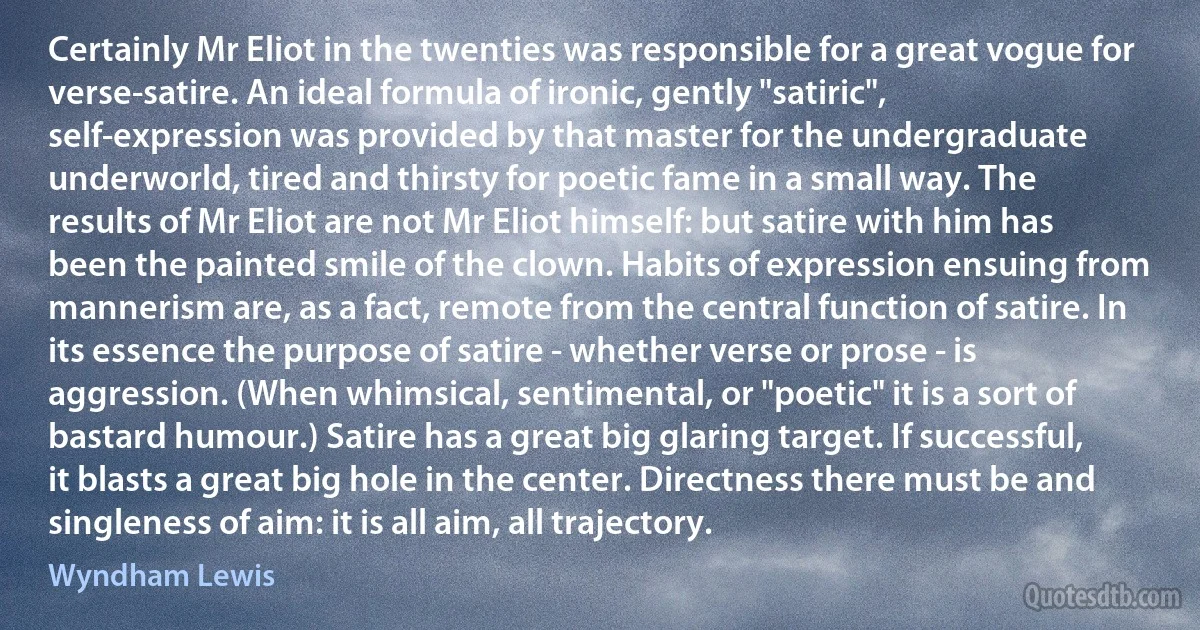
Certainly Mr Eliot in the twenties was responsible for a great vogue for verse-satire. An ideal formula of ironic, gently "satiric", self-expression was provided by that master for the undergraduate underworld, tired and thirsty for poetic fame in a small way. The results of Mr Eliot are not Mr Eliot himself: but satire with him has been the painted smile of the clown. Habits of expression ensuing from mannerism are, as a fact, remote from the central function of satire. In its essence the purpose of satire - whether verse or prose - is aggression. (When whimsical, sentimental, or "poetic" it is a sort of bastard humour.) Satire has a great big glaring target. If successful, it blasts a great big hole in the center. Directness there must be and singleness of aim: it is all aim, all trajectory.
Wyndham LewisRelated topics
aggression aim central clown directness fame great hole master purpose singleness small smile sort thirsty trajectory undergraduate underworld vogue way Eliot self-expressionRelated quotes
Yasuji Okamura, commander of the Japanese forces in China, had this to say about the Chinese Nationalist Army: "The center of resistance was neither the four hundred million Chinese civilians, nor the two million-strong ragtag army composed of local troops. Instead, it was the Central Army, led by the young officers of the Whampoa Military Academy, with Chiang Kai-shek at its nucleus. In numerous major battles, the Central Army not only was the main force engaged in combat, but also oversaw the local troops who were increasingly losing the will to fight. The Central Army kept the local troops from wavering. As seen, training by Whampoa was thorough, and it was impossible to resolve the China Incident peacefully with the existence of such an army.

Yasuji Okamura
In her book, Philosophy in a New Key, Susanne Langer remarks that certain ideas burst upon the intellectual landscape with a tremendous force. They resolve so many fundamental problems at once that they seem also to promise that they will resolve all fundamental problems, clarify all obscure issues. Everyone snaps them up as the open sesame of some new positive science, the conceptual center-point around which a comprehensive system of analysis can be built. The sudden vogue of such a grande ideé, crowding out almost everything else for a while, is due, she says, "to the fact that all sensitive and active minds turn at once to exploiting it. We try it in every connection, for every purpose, experiment with possible stretches of its strict meaning, with generalizations and derivatives.”.

Clifford Geertz
Unchecked, the tourist will climb over the fence and come right into your house to take pictures of you in your habitat. Cities mindful of tourists have built elaborate "tourist traps” which, luckily, work. Tourists are kept confined to these, and few escape. There is, of course, the type known as the "intrepid tourist.” This one has to be watched carefully or he can become most annoying. Little wonder these are so often the target of terrorists. If there is an aspect of benign terror about the tourist, there is also a great deal of tourist in the terrorist. Terrorists travel with only one thing in mind, just like the tourist, and the specifics of places escape them both. Terrorists travel for the purpose of shooting unsuspecting foreigners, just as tourists travel for the purpose of shooting them with a camera.

Andrei Codrescu
The problem is this: Nature has assembled all these species on this planet. The human species is no more important than any other species on this planet. For some reason, man accorded himself a superior place in this scheme of things. He thinks that he is created for some grander purpose than, if I could give a crude example, the mosquito that is sucking his blood. What is responsible for this is the value system that we have created. And the value system has come out of the religious thinking of man. Man has created religion because it gives him a cover. This demand to fulfill himself, to seek something out there was made imperative because of this self-consciousness in you which occurred somewhere along the line of the evolutionary process. Man separated himself from the totality of nature.

Thomas Ligotti
Every time a Black Freedom Fighter is murdered or captured, the pigs try to create the impression that they have quashed the movement, destroyed our forces, and put down the Black Revolution. The pigs also try to give the impression that five or ten guerrillas are responsible for every revolutionary action carried out in amerika. That is nonsense. That is absurd. Black revolutionaries do not drop from the moon. We are created by our conditions. Shaped by our oppression. We are being manufactured in droves in the ghetto streets, places like attica, san quentin, bedford hills, leavenworth, and sing sing. They are turning out thousands of us. Many jobless Black veterans and welfare mothers are joining our ranks. Brothers and sisters from all walks of life, who are tired of suffering passively, make up the BLA.

Assata Shakur
